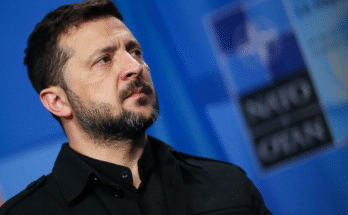Welcome to Declassified: Your Weekly Dose of Political Punchlines
European observers, no doubt holding their breath over Donald Trump’s trade war antics, might have let out a collective sigh of relief this week. Why? Because UK Prime Minister Keir Starmer just pulled off a “huge” new deal, slashing tariffs on British cars from 25% to 10% and completely ditching them for both countries’ aerospace industries. Meanwhile, over in the EU, where trade talks with the U.S. are considerably more… tense, policymakers might want to take a page out of Starmer’s absolutely flawless negotiation playbook.

1. Label Every Tiny Step a “Landmark” or “Major” Victory
The UK government wasted no time crowing about this “stonking diplomatic achievement.” Starmer himself gushed about the “landmark” deal, calling it a “great day for both nations” that would usher in boundless prosperity.
Now, let’s not get bogged down by minor details like the fact that this accord isn’t finished (those 25% steel tariffs are still looming) or even guaranteed (Congress still has to ratify it). And yes, the new trade relationship is still demonstrably worse than what the UK enjoyed a mere three months ago. But unlike his continental counterparts, Starmer understands that Trump is a man of superlatives, and nuance is his sworn enemy. Remember those almost entirely blank negotiation papers that accidentally surfaced? They proved Trump cares more about the appearance of a deal than its actual substance. Perhaps EU leaders should take note and just send Trump a bouquet of Big Macs with “DEAL” plastered on them, declaring a mutually prosperous trade relationship has already been agreed upon. He’d be hard-pressed to reject such flattering overtures. Which brings us to…
2. Master the Art of Unfathomable Sycophancy
UK media has been abuzz about the surprising “chemistry” between the stiff, socially awkward Starmer and the White House’s brash tycoon. On paper, the UK’s staunchest centrist and the populist disruptor-in-chief seem like an awful match. Yet, they’ve apparently hit it off so well that Trump himself declared, “The U.K. is very well protected. You know why? Because I like them. That’s their ultimate protection.” It’s hard to imagine Trump genuinely warmed to Starmer’s rather drab aesthetic or his penchant for fiscal responsibility. No, it all boils down to Starmer’s extraordinary talent for, well, compliments.
Despite their political differences, Starmer hasn’t uttered a single critical word about his US counterpart, even when Trump threatened economic warfare against the UK. Instead, he’s adopted the anxious, sweatily appeasing demeanor of a husband caught in a string of infidelities. He’s lavished Trump with royal gifts, stooped to pick up documents on the president’s behalf, and clapped him matily on the back as if they were old Boy Scout buddies. EU leaders ought to follow suit, blending sycophancy with blatant appeals to national stereotypes. Friedrich Merz could present Trump with a super-sized bratwurst engraved with his name in gold leaf. Macron should ditch those excruciatingly hyper-masculine handshakes and instead swoon melodramatically at the strength of The Donald’s grip, throwing in an exaggerated “sacre bleu!” for good measure.
3. Just Be British
As an American, the US president seems to have a natural deference towards Britain’s institutions and political class. It’s probably a mix of their shared history, those smooth public school accents, the lucrative Trump-branded golf resorts in Scotland, and a general sympathy for the UK’s long, post-imperial struggle (and utter lack of bargaining power). It also undoubtedly helps that the Brits speak English, a language Trump himself has nearly mastered.
The concept of continental “Europe,” however, can be a head-scratcher for Americans. Is it a country? A political union? A mythological landmass, like Numenor? A vast offshore military base where the US Army occasionally sends young privates to play-fight the Germans? Even to Brits, just across the channel, the idea that Europe is anything more than a workforce for a vast constellation of beachside Premier Inns is tough to grasp. Sadly, this particular “lesson” might not be easily implemented — the Europeans haven’t even figured it out themselves yet.

CAPTION COMPETITION
“I’m already cleaning up after the rest of your mess — what’s a few papers?”
Can you do better? Email us at ndelgado@politico.eu or get in touch on X @POLITICOEurope.
Last week we gave you this photo:
Thanks for all the entries. Here’s the best one from our mailbag — there’s no prize except the gift of laughter, which I think we can all agree is far preferable to cash or booze.


